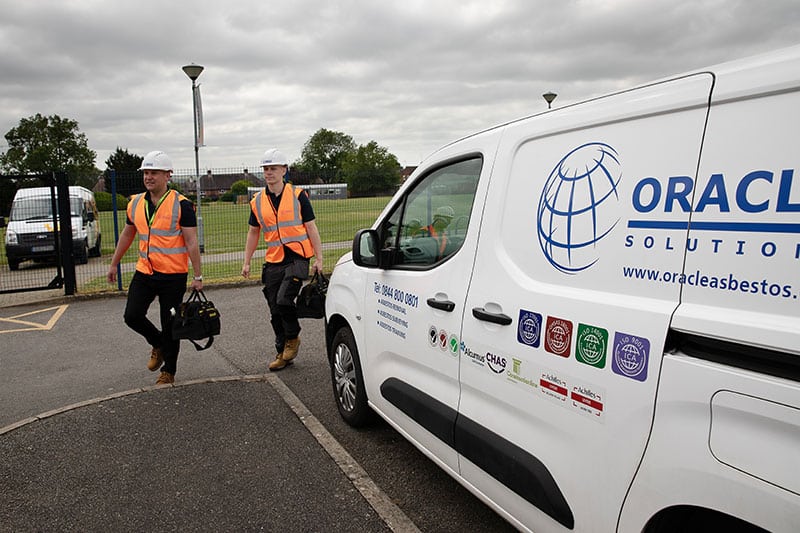How Do I Become an Asbestos Consultant? The Skills and Qualifications Needed
After all, while the naturally occurring mineral known as asbestos has long ceased to be used in the UK industries – such as shipbuilding and construction – in which it was heavily used for much of the 20th century, the effects of the “asbestos century” on human lives are still playing out today.
The importation and use of asbestos in the UK was finally banned in 1999. But with asbestos having been used in a huge range of products since it was first commercially mined in the mid-19th century, there continues to be a need to manage asbestos where it is still present in buildings up and down the country.
In the event that someone breathes in or ingests asbestos, they can be at heightened risk of developing a potentially fatal health condition – such as mesothelioma or asbestos-related lung cancer – many years, or even decades, later.
This helps to explain why an entire asbestos management industry has sprung up and continues to thrive today. Stringent regulations now exist in the UK to help building owners keep people safe from asbestos, and asbestos consultants play a major role in making this a reality.
If you are considering becoming an asbestos consultant yourself, this can unquestionably be a greatly rewarding career path to take. It is a job that helps to make a real difference to people’s lives, and that can present plentiful scope for career advancement.
But what are the skills, knowledge, and qualifications that you will need to obtain in order to embark on asbestos consultancy as a career?
Understanding the role of an asbestos consultant
With there being so many different types of asbestos professional, some confusion can arise as to what an asbestos consultant does and doesn’t do.
An easy way to understand the role of an asbestos consultant, is that they tend to focus more on the managerial and planning aspects of dealing with asbestos. By contrast, asbestos surveyors and asbestos removal operatives work directly “in the field” – in other words, in the physical locations where asbestos may be present and might therefore have to be managed and/or removed.
If, then, someone is a “dutyholder” under the Control of Asbestos Regulations 2012 (CAR 2012) – which is the key legislation setting out the asbestos requirements that those managing and maintaining non-domestic premises must comply with – they might turn to an asbestos consultant for broad expertise and guidance on how to manage this material in their buildings.
The journey to becoming an asbestos consultant: steps and considerations
As we stated above, asbestos consultancy as a specific role is concerned with giving broader advice and assistance with asbestos management than is the case for other types of asbestos professional. So, you are likely to come to this role having already gained extensive qualifications, knowledge, and experience in the asbestos industry.
By this, we mean that many people who are now working as asbestos consultants formerly worked directly “in the field”, in roles such as asbestos surveying and removal. But in order to get into those roles, you will need to gain certain qualifications and experience.
We have provided further information later in this article on potentially relevant degrees and other training options. It is worth emphasising, however, that with the whole nature of working in the asbestos industry including a need to stay abreast of the latest regulations, as well as to keep your own knowledge up to date, you cannot expect your asbestos training to be a “one-time-only” act.
Instead, you will need to be committed throughout your career to continuous learning, including refreshing your existing knowledge, as well as to staying updated on the current regulations.
And of course, you will need to go so much further than simply knowing what the latest asbestos-related legislation is – you will also need to understand the implications of those rules for your clients’ management of asbestos on their premises.
Essential skills and attributes for asbestos consultants
The skills and attributes that an asbestos consultant will require in order to be a success in this role, overlap greatly with those required by other types of asbestos professional.
A successful asbestos consultant will be a great communicator, for instance, as well as someone with a high level of attention to detail, and problem-solving and critical thinking skills. They will also be able to work effectively both independently and as part of a team.
Educational pathways: degrees and certifications
There is a wide range of potential routes to life as an asbestos consultant. Many people who eventually go on to take up this role, effectively began their training with a related degree course, in a subject such as environmental science or occupational health, before proceeding to take on more asbestos-focused training courses and qualifications.
If, for instance, you are interested in eventually moving up to an asbestos consultancy role after first developing a career as an asbestos surveyor, you will probably be looking to gain what is known as the P402 qualification. This qualification is suitable for a wide range of professionals in the asbestos industry, so it provides a strong foundation of background knowledge and practical skills in asbestos management, on which to build.
However, it is also true that many other relevant courses and certifications exist, which could greatly aid you in your journey to eventually becoming an asbestos consultant. These encompass the likes of:
- P401, which relates to the identification of asbestos in bulk samples
- P402 which relates to asbestos surveying
- P403 in air sampling and fibre counting
- P404, which relates to clearance testing and the requirements of a certificate for reoccupation
- P405, which relates to the management of asbestos in buildings, including asbestos removal
- P406, which focuses on supervision and management of the safe removal and disposal of asbestos
There is also the British Occupational Hygiene Society (BOHS) proficiency Certificate, known as S301. Gaining all six preliminary certificates or the S301 followed by showing evidence of experience and then a successful oral examination gains you the Certificate of Competence in Asbestos, also known as CoCa.
As above, an asbestos professional can gain this particular qualification through two or more examinations:
- A written examination – S301 ‘Asbestos and other fibres’ or written examination in the six preliminary certificates.
- Providing written evidence of experience.
- An oral test. In order to sit this test, a candidate will need to have first passed the written examination, in addition to gaining a minimum of six months’ practical experience. Before completing this second test, the candidate will be expected to submit a written report on a suitable asbestos subject.
Whatever specific path you take to become a trained asbestos consultant, having the accompanying certificates from passing courses like those detailed above, will greatly help to demonstrate your expertise and compliance with industry standards. This, in turn, will significantly reassure potential clients.
Professional experience: gaining practical knowledge
As we touched on above, asbestos consultants often take on this role having already gained extensive hands-on experience in asbestos assessment and management.
Someone may come to an asbestos consultancy role having long worked as an asbestos removal operative, for example. This dimension is important, because practical experience in the asbestos industry will greatly help to enhance an asbestos consultant’s consulting skills and decision-making.
Regulations and legal knowledge: staying compliant
One of the most crucial aspects of an asbestos consultant’s role, is ensuring they have a thorough knowledge of the latest regulatory framework for asbestos management.
After all, their clients will be depending on them to provide the most accurate and up-to-date information and advice, and any failure of the asbestos consultant to do so could have very serious real-world practical and legal consequences.
So, if you aspire to work in an asbestos consultancy role, you will certainly need to be extremely well-versed in CAR 2012 and other relevant legislation. Staying updated with how such regulations may evolve over time is another standard part of life as an asbestos consultant.
Effective risk assessment and management: the core of the role
Absolutely central to any asbestos consultant’s role, is the process of assessing the risk that asbestos might present to human health in any given premises.
No property in which asbestos might be present will be exactly the same as another property that contains ACMs. So, the client will expect suitably tailored advice on how they can safely and responsibly manage and/or remove the asbestos on their own site.
An asbestos consultant may not work “in the field” in the way that an asbestos removal operative or surveyor does, but they will work closely with such professionals in order to devise and recommend appropriate management strategies to their clients.
Communication and client interaction: bridging the gap
Communication is another huge part of the asbestos consultant’s role. In order to be successful as an asbestos consultant, you will need to be able to communicate extensively and effectively with a broad range of clients, contractors, and other stakeholders.
Much of this communication will include the explanation of complex concepts to non-technical audiences. This will help to ensure everyone who benefits from your consultancy services will be in no doubt about the steps they must take in order to achieve compliance and keep people safe from asbestos.
By building trust and rapport with a wide range of stakeholders, asbestos consultants can play their own strong part in ensuring everyone with responsibility for the safety of a building adopts the right measures, whatever the current asbestos situation in the given premises may be.
Health and safety considerations: prioritising worker and public safety
The processes involved in managing asbestos – including surveying, assessment, and potential removal or other forms of asbestos mitigation – necessitate adherence with all relevant health and safety protocols.
Again, this is a subject that a capable asbestos consultant will be exceedingly well-informed on. This, in turn, will enable them to communicate genuine authority to their clients in relation to such matters as personal protective equipment, containment, and safe working practices.
Through all of this, an asbestos consultant will greatly contribute to the creation of safe working environments, thereby protecting both workers and the broader public who may come into contact with a given site.
Conclusion: pathways to success as an asbestos consultant
There is a lot that you will need to think about if you are interested in training and “working up the ranks” to become an asbestos consultant.
Asbestos consultancy is a role that necessitates having not only the most suitable qualifications, but also a truly multifaceted all-round skillset. The latter will include the ability to think critically, solve problems, and communicate well with a broad variety of stakeholders involved in the management of a given premises’ asbestos situation.
As we referenced above, asbestos consultancy can certainly be an extremely rewarding line of work, and here at Oracle Solutions, we would always recommend it! However, it is also the kind of highly specialised role for which you will need to be suitably vigilant and thoroughly prepared, if you are to be a success.

Written by Jess Scott
Jess Scott has been an all-round asbestos consultant since 1996. That’s nearly 3 decades of asbestos knowledge. He spends his time sharing that knowledge with the team at Oracle and with their clients. Jess's goal is, and always has been, to use my expertise in helping people to comply with the law. This legal compliance ultimately helps to protect everyone from the harmful effects of asbestos. Jess has acted as an asbestos expert witness in legal cases and is involved in many asbestos educational activities throughout the UK.

